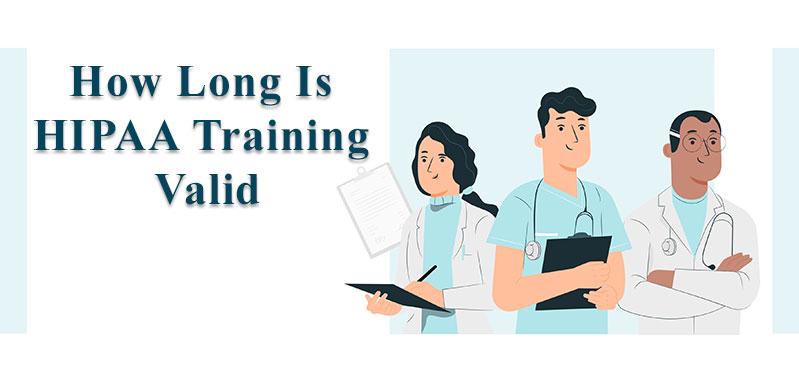
How Long Is HIPAA Training Valid
HIPAA training is an essential mandate governed by the Security and Privacy Rule under the Health Insurance Portability and Accountability Act (HIPAA). Compliance with HIPAA regulations demands organizations prioritize training and allocating resources to equip employees with the necessary skills, knowledge, and awareness. While organizations may develop their training programs, specific requirements are outlined by law to ensure effective training, enhancing understanding and fostering compliance with HIPAA. However, there are no specific rules set for HIPAA training for compliance officer 2024, but it's essential to keep an eye on the latest policies and amendments in the HIPAA training.
Let's engage with this article diving into the world of HIPAA training compliance and the best practices to keep the PHI secure.
What is HIPAA Training?
HIPAA, a cornerstone of healthcare data regulation in the United States, aims to safeguard personal health information (PHI) through rigorous requirements for covered entities and business associates.
For organizations, HIPAA training involves implementing security measures and educational programs to instruct staff, including employees, contractors, and third-party individuals, on mandated policies and procedures. This training is vital for achieving HIPAA compliance and constitutes a significant part of an organization's regulatory journey.
HIPAA training objectives encompass ensuring all employees grasp best practices to support operations without violating HIPAA regulations. Consistent training fosters an organizational understanding of compliance evolution, addressing deficiencies and blind spots. It also familiarizes employees with internal mechanisms like risk assessments and multi-factor authentication, ensuring HIPAA-compliant operations. Documenting these activities demonstrates a commitment to compliance, which is essential for both internal review and regulatory scrutiny.
In 2024, HIPAA training standards encompass various aspects, including the Privacy Rule Training Standard, emphasizing lawful use and sharing of protected health information, and the Security Rule Training Standard, mandating all employees, including management, to undergo security training to bolster data protection measures.
What are the Requirements of HIPAA Training?
Under HIPAA, the Security Rule (45 CFR §164.308) and the Privacy Rule (45 CFR §164.530) require subject organizations to conduct HIPAA training as discussed below.
HIPAA mandates comprehensive training for covered entities and their business associates to ensure the protection of personal health information (PHI). The Security Rule (45 CFR §164.308) and the Privacy Rule (45 CFR §164.530) require subject organizations to secure PHI and conduct HIPAA training.
The Privacy Rule training standard applies solely to covered entities and focuses on training their workforce on PHI-related policies, breach reporting, and compliance obligations. New employees must receive training promptly upon joining, and refresher training is necessary when policies undergo significant changes or when specific events like patient complaints or risk assessments occur.
In contrast, both covered entities and business associates must adhere to the Security Rule training standard, which requires the establishment of a security awareness and training program for all employees. This program aims to prevent, detect, contain, and correct security violations, emphasizing the importance of periodic security updates, guarding against malware, monitoring login attempts, and maintaining secure passwords.
Under the Privacy Rule, covered entities must develop and implement policies and procedures aligned with PHI protection requirements, ensuring comprehensive training for all workforce members. They are also required to designate a privacy official and a contact person for handling complaints and inquiries.
Meanwhile, the Security Rule necessitates covered entities and business associates to enforce stringent security measures, including policies and procedures for addressing security violations and implementing appropriate sanctions for non-compliance. A comprehensive security awareness and training program encompassing all employees is crucial for maintaining HIPAA compliance and safeguarding sensitive health information effectively.
What to Cover in HIPAA Compliance Training?
Non-compliance with HIPAA regulations can lead to severe consequences for organizations and individuals alike. Monetary fines for violations can range from $100 to $50,000 or more per breach, with an annual maximum of $1.5 million for repeated violations. These fines can swiftly escalate, especially if multiple breaches occur concurrently, posing a significant financial strain on the organization.
Moreover, individuals found guilty of knowingly misusing or disclosing unsecured protected health information (PHI) may face criminal charges, including fines and imprisonment, depending on the gravity of the offense. The potential loss of trust from patients or clients following a breach can result in a detrimental impact on the organization's reputation, leading to decreased business, clients, and revenue.
Additionally, entities found non-compliant or penalized may be subjected to heightened scrutiny, necessitating more frequent and detailed audits, which can be resource-intensive and require additional allocation of funds and personnel to compliance efforts.
HIPAA training for compliance officer 2024 serves as a vital component of ensuring organizational compliance with the regulations. While training methods may vary across organizations, certain core elements are essential for effective training programs. Employees must have a comprehensive understanding of the various HIPAA Rules, including the Privacy Rule and the Security Rule, which lay the groundwork for compliance efforts. Awareness of potential HIPAA violations and the regulatory consequences associated with them is crucial to instill a culture of compliance within the organization.
Employees should also be educated about immediate and potential threats to PHI, empowering them to identify and mitigate risks effectively. Moreover, training sessions should cover HIPAA waivers in emergencies, outlining procedures and implications for PHI protection during crises. Regular updates on HIPAA regulations are essential to ensure employees remain informed about any changes affecting their responsibilities. Providing a HIPAA compliance checklist aids in facilitating ongoing compliance efforts by enabling employees to verify adherence to procedural requirements.





